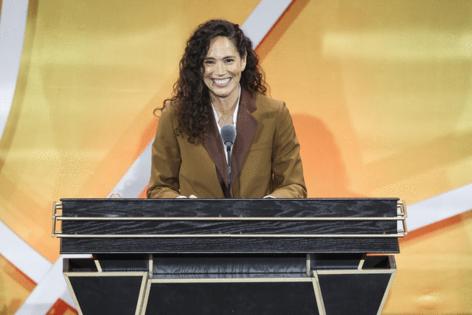Mike Vorel: Sue Bird spent her Hall of Fame speech, like her career, handing out assists
Published in Basketball
SEATTLE — When it comes to winning, the Naismith Basketball Hall of Fame saved its best for last.
On Saturday night, nine new inductees — five players, one executive, one coach, one referee and one entire team — were bestowed basketball’s biggest honor. They took turns telling stories and thanking loved ones from an overflowing auditorium in Springfield, Mass., where the sport was invented in 1891.
For more than two hours, the star-studded speeches stacked up — Sylvia Fowles, then Dwight Howard, then Micky Arison, then Danny Crawford, then Maya Moore, then USA Basketball’s 2008 “Redeem Team,” then Billy Donovan, then Carmelo Anthony, a marathon of round ball royalty.
Finally Sue Bird took the stage.
Finally, after two-plus decades of dogged dominance. After 367 WNBA wins. After four WNBA championships, two NCAA championships, four FIBA World Cup championships and five EuroLeague Women championships. After more games (580) and assists (3,234) than any player in WNBA history. After her No. 10 was raised into the rafters at Climate Pledge Arena and a bronze statue was unveiled on the street outside.
But Bird didn’t spend her speech reading from a ridiculously robust resume.
She used the spotlight to uplift others — to distribute, same as when she played.
For 13 minutes, the consummate point guard piled up assists. She thanked her mom (Nancy), her dad (Herschel) and her older sister Jen. She thanked coaches from grade school to AAU to Connecticut to Seattle. She thanked the neighborhood boys who picked her first for pickup games and the security guard who asked for her autograph at age 11. She thanked the doctors and surgeons who helped prolong a prolific and persevering career.
She joked: “This moment is truly overwhelming. There’s hundreds of people in here that I could thank, and those are probably just my surgeons.”
She thanked Storm teammates Breanna Stewart, Jewell Loyd and Lauren Jackson, among so many more.
“In Seattle, after arriving as the first pick of the first-ever WNBA draft lottery, it was the veterans who didn’t see me as a competitor but as a 21-year-old kid just building a brand-new life,” Bird said. “They took me to breakfast. They showed me where the grocery store was. They showed me the ropes in every way.”
But Saturday was not about Bird’s monumental, cemented legacy in Seattle. That’s what the statue and street name outside the arena are for.
It was about the steadfast belonging she found in basketball. And it was an acknowledgment that she doesn’t merely belong alongside Seattle’s best, or UConn’s best, or the WNBA’s best. Her greatness is global.
She belongs among basketball’s best, full stop. She belongs on that stage.
But it took a tapestry of support and gratitude to help her get there.
“Each of you helped this point guard get the most out of the chip on my shoulder in the game that values scoring above all, motivating me to prove people wrong and find my footing in whatever moment found me,” Bird said, addressing her audience. “Sometimes that meant stepping up as a scorer. Other times it meant facilitating. But eventually, it meant growing from a behind-the-scenes leader to someone comfortable using her voice for what she believes in.
“At every step, it all came down to this: I couldn’t have found my place if I wasn’t lucky enough to find my people.”
Bird, the WNBA’s assists queen, also forged her path by finding others. In a video package, South Carolina coach Dawn Staley said Bird “was about as well-rounded as any point guard there will ever be.” Jackson added that “when Sue came in [as a Storm rookie], she was already elite. The leadership that she had from that very young age elevated everybody around her.”
For Bird, excellence didn’t always come easy. Her durability is a testament to the pony-tailed point guard’s unwavering resolve. She tore an ACL eight games into her freshman year at UConn. Her career included six surgeries on her left knee, one surgery on each hip, five broken noses and numerous reinventions.
“My dad used to call me ‘Peanut’ because when I’d go to these national tournaments [as a kid], I looked tiny standing among the other girls,” Bird said. “But that turned out to be a gift too, because I couldn’t fall back on overpowering anyone physically. I had to develop my basketball IQ at a really young age to bridge that gap.”
For Bird, the gaps were gifts. The bridges were built to last, same as her statue.
They led to an auditorium in Springfield, Mass.
To a night filled with assists, both given and received, in a grand finale that didn’t disappoint.
“This Hall of Fame induction isn’t just about individual achievement,” Bird said to close the show. “It’s about joining a community where I’ll always belong, a belonging that can never be taken away. In other words, I’ll close with something point guards don’t often get to say: thank you for the assist.”
____
© 2025 The Seattle Times. Visit www.seattletimes.com. Distributed by Tribune Content Agency, LLC.







Comments